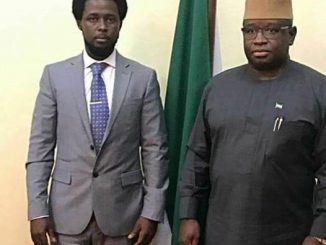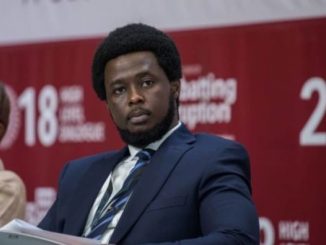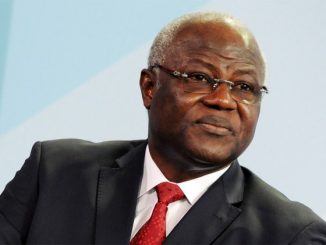
With Organised Hypocrisy, People’s Indifferences & Impunity Are the Best Breeding Grounds for Corruption to Grow.
An article titled “SLPP accused of planning to steal 2028 elections by creating new electoral districts in its stronghold and Freetown” (thesierraleonetelegraph.com (May 29-2025) seems to invoke post 2023 general elections with a bad taste of Déjà vu.
The Tripartite Committee was commissioned and concluded, with the overriding objective to ensure that we have sufficient guardrails to “strengthen our democratic institutions and processes, promote inclusive participation, and accountability; in order to guarantee democratic legitimacy and the credibility of electoral processes. It is halfway through the last election cycle and the opposition APC party has responded to a statement by the Ministry of information.
The article quotes that “According to a statement by the ministry of information in Freetown, “Minister of Local Government and Community Affairs, Tamba Lamina, announced that Cabinet has approved the creation of two new districts: Bandajuma, which will affect areas in Bo and Pujehun Districts, and Panguma, which will impact communities in Kenema and Kailahun Districts. He also revealed that Freetown will be divided into two districts and the Western Area Rural into three. Additionally, Lungi will be declared a new city due to its strategic location and proximity to the international airport.”
In a press statement, the APC reportedly described it as “unconstitutional, abuse of power, a blatant attempt to subvert the constitutional order and to distort future parliamentary seat allocations and political boundaries in favour of the ruling party”. The APC sees this as “nothing but a naked abuse of power and the APC will not accept it”. The party criticises the SLPP that, “the creation of new districts or cities must be a data driven process, firmly rooted in the findings of a credible, inclusive and transparent national census. The current census process, shamefully, has not even begun in earnest. There has been no publication of a final project document. There are no preliminary results. There is no validated data. The Technical Committees which should be guiding the process with integrity and inclusivity, are not even fully constituted, and to make matters worse, the APC the largest opposition party has been deliberately excluded from the Census Technical Committee. Yet, the Minister now arrogantly announces that cabinet has already approved new districts and cities? The APC cautions that “such premeditated actions completely undermine the purpose and credibility of the census and render the entire process a sham”. Is this a political VAR in play here? Phew.
So, why do we conduct national censuses?
A census is an official count of all people and households to assess the size of the population and calculate what they need. It includes information about the age, sex, education, employment, religion etc about the people living in a country. The United Nations recommends governments to conduct a census every 5 to 10 years. One of the main functions of a census is to help governments plan on how to assess, address and allocate resources across the country, based on local population needs. The bigger the population, the bigger the allocated resources.
Governments can use a census to determine the number of representatives a given community will have in government. The larger the population, the more the “proportional” parliamentary representatives in the government. In the last two decades, and irrespective of the government of the day, it has been a political ritual for every census to generate the creation of new regions like Districts and Chiefdoms. These censuses seem to attract surveyors for geomantic gymnastics and like Town Criers, remind us of upcoming elections.
While many would plausibly see the delimitation of boundaries as in response to population changes, others across the political spectrum and with a penchant for cynicism see these new “inventions” as gerrymandering and political gymnastics, all aimed to give advantage to one particular political party over the other. When governments say that delimitation is to “have more parliamentary representatives in the government than a less populated one” many people find this rationale hollow. Some people wonder why such delimitations always take place in the traditionally strongholds of the ruling political party of the day; be it the APC or SLPP? Is this why the APC is spitting feathers? Is this why cynics see a census as governments’ mechanism for distributing largess and the census forms as the ticket to do so? Wouldn’t it be nice to know the kind of data triggering these delimitations? Have there been some population explosions or like Gondwanaland, global warming that has led to some growth in our land mass?
So, how did we get here?
The APC Party might win some sympathy for crying foul in this case, but a lot of people would equally question whether the APC is qualified enough to be the referee or VAR in this matter. They would recall that in 2017, former President Ernest Koroma of the APC pronounced the “rebirth of one more region [Northwest], two more districts [Karene and Falaba] and 49 more chiefdoms in what he referred to as “correcting historical wrongs” in Sierra Leone. During his speech at the time in Makeni, he stated that “… following the partition of Africa, the colonialists had established 217 chiefdoms and 13 districts in the first place.” Indeed, amalgamation of these chiefdoms resulted into 147 chiefdoms chiefly because of economic, social and political reasons, much to the annoyance of some chiefs according to the post-civil war truth and reconciliation report.
His argument was that “the amalgam of chiefdoms were meant to cut corners in colonial administration which resulted in the creation of hard to reach chiefdoms administratively to the annoyance and disenchantment of disadvantaged silent protester-populations in some amalgamated chiefdoms.”(Cockorioko.net -29 July, 2017). Surprise, surprise, Karene and Falaba are in the traditional strongholds of the APC, just like the SLPP’s in the proposed areas in Pujehun, Kenema and Kailahun. So, who’s fooling who? Mornehhh. Apohlleh.
The tragedy of political party above national interests:
With the tragedy of political party loyalties and allegiances replacing national patriotism, it’s becoming increasingly normal that our body politic and political discourse have descended into partisan antagonism. The political blood pressure and temperature in our motherland are now measured by the amount of hatred and antagonism between our two gargantuan parties. The situation is so bad, that our indifferences to political malpractices are normalised and acceptable; as long as they favour our personal political persuasions. We allow unprecedented precedents to be set, without asking ourselves: what happens when the shoe is on the other foot? We turn a blind eye, glorify the abnormal but cry foul, when night turns into day. We forget that it is our indifferences that create the best breeding grounds for corruption to grow, and it is the corresponding impunity that provides the very foundations upon which systems of corruption are built. This is how our country has degenerated into Revenge Politics.
Sadly today, just like I have demonstrated as an example here (for discussion sake), we use the actions or inactions of the party opposite to justify or rationalise bad policies, bad governance or bad political decisions. We turn a blind eye because it is my party and cry foul when it is the other party, forgetting that Sierra Leone’s politics is a playground of musical chairs for political gymnastics. We keep changing the players and rules of the game. After the APC described its delimitation process as “Correcting historical wrongs” from the 1884-1885 Berlin Conference, prior to the 2018 elections, it is apparently appealing to the court of public opinion for arbitration.
What does this mean for our country?
Is this the best way to broaden our knowledge of geography or our civic education? At this rate, should we be updating our geography and civics books or changing our school curricula every 5 years? So, what are the chances that one day, you could wake up and find your veranda in one district and your outside toilet in another, because the boundary went through your yard? With the potential for more parliamentarians, are we going to get more Deputy Ministers and Deputy to the Deputy Ministers of the same Ministries? What would this mean for our national budget, considering the nice perks, a good pension package and other accoutrements that come with representing your people?
The APC boycotted the last census, and many believe that this was to its cost and was ill- advised. Thankfully, the party is reportedly preparing to participate this time. Nevertheless, it had previously expressed concerns that “the data processing timeline from January to August 2026 risks derailing both national development planning and the constitutional electoral cycle”. The APC has expressed serious concerns about the process that “the creation of new districts or cities must be a data driven process, firmly rooted in the findings of a credible, inclusive and transparent national census. The current census process, shamefully, has not even begun in earnest. There has been no publication of a final project document. There are no preliminary results. There is no validated data. The Technical Committees which should be guiding the process with integrity and inclusivity. Well-meaning Sierra Leoneans would hope that these concerns, complaints and angst are resolved peacefully between the two parties before 2028, Insha Allah.
In the meantime, let us hope and pray that, while our politicians masquerade their personal interests as a battle of principles, we don’t allow them to turn us against one another when they preach integrity from the den of corruption.
Don’t forget to turn the lights off when you leave the room.
Abdulai Mansaray.




Leave a Reply